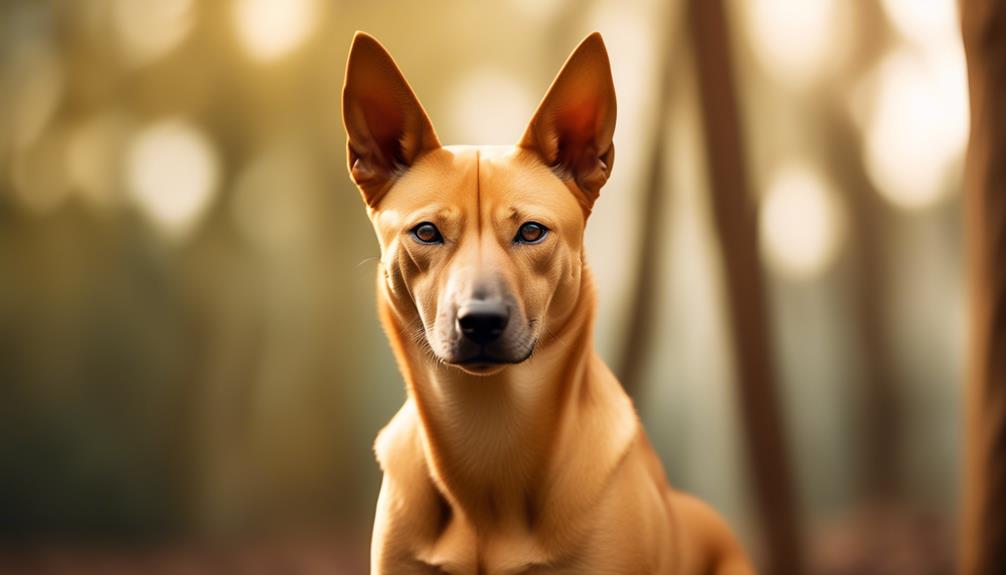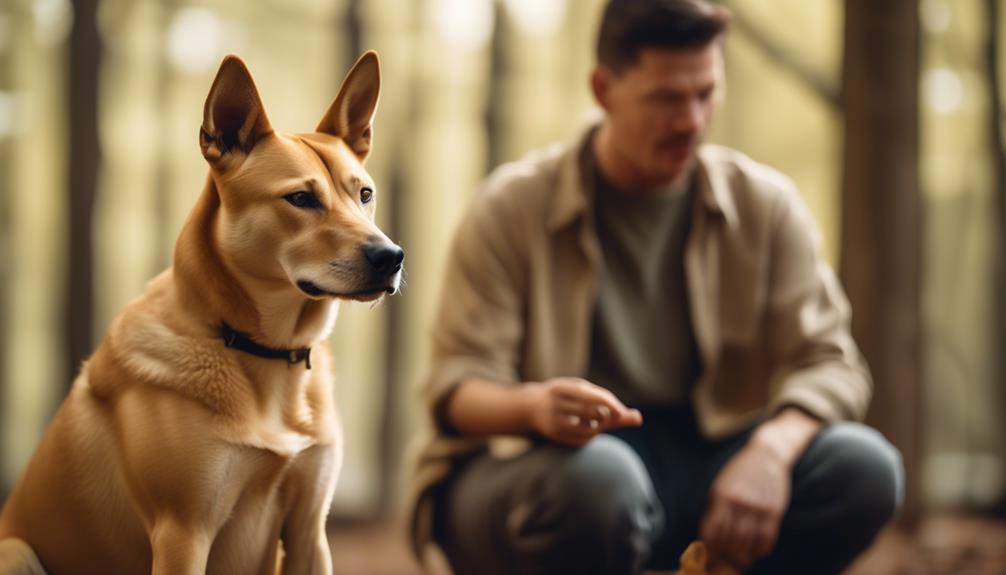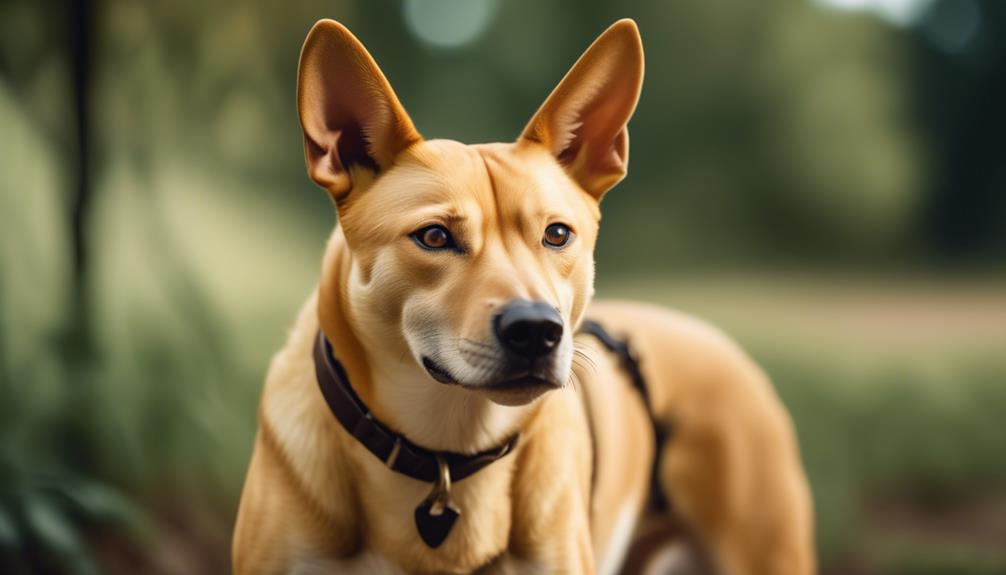Are you searching for a canine companion that stands out from the rest? Look no further than the Carolina Dog! With their ancient origins and captivating appearance, these dogs have a story to tell.
But that's not all – they also possess high intelligence and an independent nature that sets them apart. So, if you're curious to learn more about this unique breed and what makes them so special, keep on reading…
Key Takeaways
- Carolina Dogs originated in Asia and migrated to North America around 9,000 years ago.
- They have a striking appearance and are highly intelligent and independent.
- Carolina Dogs require at least 60 minutes of exercise per day and groom themselves like cats.
- Training and socialization are important to manage their behavior and prey drive.
History and Origin
Carolina Dogs have a fascinating history and origin that can be traced back thousands of years. These dogs originated in Asia and migrated to North America around 9,000 years ago. They've lived in the wild in the southern United States for several hundred years and can still be found in parts of Georgia and South Carolina.
Carolina Dogs have a striking appearance and are highly intelligent and independent. It's believed that they were kept as pets by Native Americans and were officially recognized as a breed by the American Kennel Club in the 1970s.
Their ancient lineage and survival in the wild make them a unique and intriguing breed with a rich history.
Characteristics and Care

To properly care for a Carolina Dog, it's important to understand their unique characteristics and specific care requirements.
Carolina Dogs have a short, smooth coat that comes in a variety of colors. They require at least 60 minutes of exercise per day and groom themselves like cats.
Regular veterinary checkups, nail trimming, and oral health care are important aspects of their care. It's recommended to feed them a high-protein diet and limit treats to prevent weight gain.
Carolina Dogs can adapt to various climates but should live indoors with their human pack. When it comes to behavior and training, Carolina Dogs have a tendency to pursue and potentially get into conflicts with wild animals while hunting.
They have varying energy levels and exercise needs, and some may bark or howl more often. While they're affectionate with their family, they may be wary of strangers, emphasizing the importance of training and socialization.
In terms of health, Carolina Dogs are generally healthy due to their wild ancestry, with minor concerns of hip and elbow dysplasia and sensitivity to Ivermectin.
When it comes to compatibility and adoption, Carolina Dogs bond well with kids and get along with other dogs, but their prey drive may make them unsuitable for small animals.
Responsible adoption can be done through local shelters and reputable breeders who provide lifetime support and prioritize health and socialization.
Behavior and Training

Behavior and training in Carolina Dogs is influenced by their natural instincts and intelligence. Here are four key aspects to consider:
- Hunting instincts: Carolina Dogs have a strong prey drive and may be prone to pursuing and potentially getting into conflicts with wild animals while hunting. This instinct should be managed through proper training and control measures.
- Energy levels: The energy levels and exercise needs of Carolina Dogs can vary. Some may be high-energy and require more physical activity, while others may be low-energy. Tailoring their exercise routine accordingly is important for their overall well-being.
- Vocal tendencies: Like many dog breeds, some Carolina Dogs may have a tendency to bark or howl more often than others. Understanding this behavior and providing appropriate training and socialization can help manage excessive vocalization.
- Socialization: Carolina Dogs are generally affectionate with their family but may be wary of strangers. Proper socialization from an early age is crucial to help them develop good behavior and manage their prey drive.
Health and Sensitivities

When considering the health and sensitivities of Carolina Dogs, it's important to be aware of potential concerns and genetic predispositions.
Overall, Carolina Dogs are generally healthy due to their wild ancestry and lack of genetic disorders. However, there are a few health issues that may affect this breed.
One minor concern is the possibility of hip and elbow dysplasia, which can cause discomfort and mobility issues.
Another sensitivity to be aware of is their reaction to Ivermectin, a medication commonly used in heartworm preventatives. Carolina Dogs may be more sensitive to this medication, so it's important to consult with a veterinarian for appropriate alternatives.
Additionally, it's advisable to research natural flea and tick treatment options and seek a veterinarian's advice in order to prioritize the health and well-being of your Carolina Dog.
Compatibility and Adoption
Carolina Dogs are highly compatible with children and other dogs, making them an excellent choice for families looking to adopt a new canine companion. Here are four reasons why Carolina Dogs make great family pets:
- Social nature: Carolina Dogs have a natural affinity for children and form strong bonds with them. They're patient, gentle, and tolerant, making them suitable playmates for kids of all ages.
- Pack mentality: These dogs have a strong pack instinct and get along well with other dogs. They enjoy the company of their canine companions and thrive in a multi-dog household.
- Adaptability: Carolina Dogs are highly adaptable and can adjust to different living conditions. Whether you live in an apartment or a house with a backyard, these dogs can easily fit into your lifestyle.
- Easy integration: Due to their social nature and pack mentality, Carolina Dogs can integrate seamlessly into a new family. With proper training and socialization, they can quickly become a beloved member of your household.
Consider adopting a Carolina Dog if you're looking for a family-friendly and sociable canine companion.
Frequently Asked Questions
Are Carolina Dogs Good Guard Dogs?
Yes, Carolina Dogs are good guard dogs. They are alert, protective, and have a strong prey drive. Their natural instincts make them excellent at detecting and alerting their humans to potential threats.
How Do Carolina Dogs Interact With Cats?
Carolina Dogs may have varying interactions with cats. It is important to introduce them properly and supervise their interactions. Some Carolina Dogs may coexist peacefully, while others may have a prey drive towards cats.
Can Carolina Dogs Be Left Alone for Long Periods of Time?
Yes, Carolina Dogs can be left alone for moderate periods of time, but it's important to provide them with mental and physical stimulation before and after being alone. Ensuring their needs are met is crucial for their well-being.
Do Carolina Dogs Shed a Lot?
Yes, Carolina Dogs shed a moderate amount. Shedding can vary depending on the individual dog and their coat type. Regular grooming and brushing can help manage shedding and keep their coat healthy.
Are Carolina Dogs Hypoallergenic?
Carolina Dogs are not hypoallergenic. While individual reactions may vary, hypoallergenic breeds have a lower likelihood of triggering allergies. Carolina Dogs have a short, smooth coat and may still cause allergies in some people.
Are Carolina Dogs and Chesapeake Bay Retrievers similar in temperament and behavior?
Yes, Carolina Dogs and Chesapeake Bay Retrievers do share some similarities in temperament and behavior. Both breeds are known for being loyal, intelligent, and energetic. However, Chesapeake Bay Retrievers are more water-loving due to their breeding for retrieving waterfowl, which sets them apart from Carolina Dogs. For more chesapeake bay retriever information and characteristics, they can be found in their breed standard.
Conclusion
In conclusion, the Carolina Dog is a captivating and intelligent breed that offers a unique companion for any family. With their striking appearance and independent nature, they'll surely make heads turn.
While they require regular exercise and socialization, their grooming needs are minimal. Carolina Dogs have a generally healthy disposition and make loyal family members.
So, whether you're an experienced dog owner or new to the world of four-legged friends, consider welcoming a Carolina Dog into your home for a truly special and rewarding experience.




